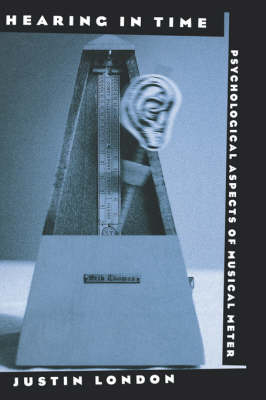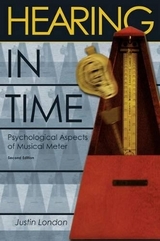
Hearing in Time
Psychological Aspects of Musical Meter
Seiten
2004
Oxford University Press Inc (Verlag)
978-0-19-516081-9 (ISBN)
Oxford University Press Inc (Verlag)
978-0-19-516081-9 (ISBN)
- Titel erscheint in neuer Auflage
- Artikel merken
Zu diesem Artikel existiert eine Nachauflage
Hearing in Time explores musical meter from the point of view of cognitive theories of perception and attention - how the ability to follow musical meter is simply a specific instance of a more general ability to synchronize attention to regularly recurring events in the environment.
Our sense that a waltz is "in three" or a blues shuffle is "in four" comes from our sense of musical meter. Hearing in Time uses cognitive theories of perception and attention to explore musical meter. London shows how our ability to follow musical meter is simply a specific instance of our more general ability to synchronize our attention to regularly recurring events in our environment. Thus, musical meter is subject to a number of fundamental perceptual and cognitive constraints that form the cornerstones of London's account. Because listening to music, like many other rhythmic activities, is something that we often do, London views it as a skilled activity for performers and non-performers alike. Hearing in Time approaches musical meter in the context of actual music performance rather than as a theoretical ideal.
Its approach is not based on any particular musical style or cultural practice, so it uses familiar examples across a broad range of music - from Beethoven and Bach to Brubeck and Ghanaian drumming - bringing out fundamental similarities between a variety of different metric phenomena, such as the difference between so-called simple versus complex or additive meters. Because of its accessible style, Hearing in Time is for anyone interested in rhythm and meter, including cognitive psychologists, musicologists, musicians and music theorists.
Our sense that a waltz is "in three" or a blues shuffle is "in four" comes from our sense of musical meter. Hearing in Time uses cognitive theories of perception and attention to explore musical meter. London shows how our ability to follow musical meter is simply a specific instance of our more general ability to synchronize our attention to regularly recurring events in our environment. Thus, musical meter is subject to a number of fundamental perceptual and cognitive constraints that form the cornerstones of London's account. Because listening to music, like many other rhythmic activities, is something that we often do, London views it as a skilled activity for performers and non-performers alike. Hearing in Time approaches musical meter in the context of actual music performance rather than as a theoretical ideal.
Its approach is not based on any particular musical style or cultural practice, so it uses familiar examples across a broad range of music - from Beethoven and Bach to Brubeck and Ghanaian drumming - bringing out fundamental similarities between a variety of different metric phenomena, such as the difference between so-called simple versus complex or additive meters. Because of its accessible style, Hearing in Time is for anyone interested in rhythm and meter, including cognitive psychologists, musicologists, musicians and music theorists.
Introduction; 1. Meter as a kind of attentional behaviour; 2. Research on temporal perception and its relevance for theories of musical meter; 3. Meter-rhythm interactions I: Ground Rules; 4. Metric representations and metric well-formedness; 5. Meter-rhythm interactions II: Problems; 6. Metric flux in Beethoven's Fifth; 7. Non-isochronous meters; 8. NI meters in theory and practice; 9. The many-meters hypothesis; Conclusion; References; Index
| Erscheint lt. Verlag | 16.9.2004 |
|---|---|
| Zusatzinfo | numerous figures and musical examples |
| Verlagsort | New York |
| Sprache | englisch |
| Maße | 152 x 234 mm |
| Gewicht | 500 g |
| Themenwelt | Kunst / Musik / Theater ► Musik ► Musiktheorie / Musiklehre |
| ISBN-10 | 0-19-516081-9 / 0195160819 |
| ISBN-13 | 978-0-19-516081-9 / 9780195160819 |
| Zustand | Neuware |
| Informationen gemäß Produktsicherheitsverordnung (GPSR) | |
| Haben Sie eine Frage zum Produkt? |
Mehr entdecken
aus dem Bereich
aus dem Bereich
Grundbegriffe, Harmonik, Formen, Instrumente
Buch | Softcover (2021)
Philipp Reclam (Verlag)
CHF 12,90



